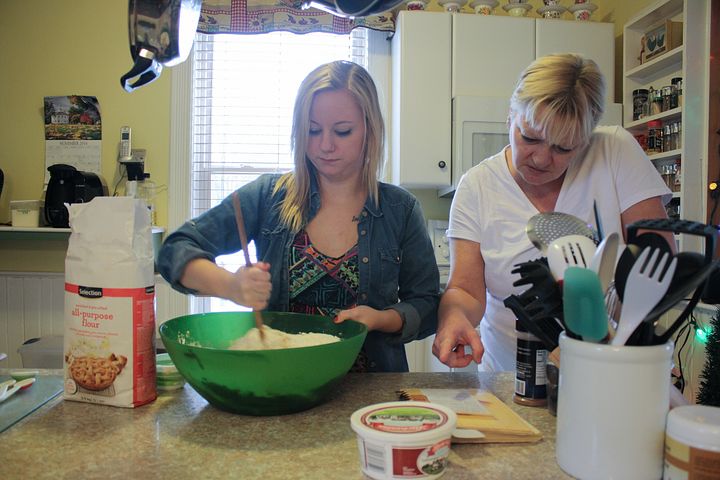Tips for Improving Your Mother Daughter Relationship

A mother daughter relationship can be tumultuous. Even the healthiest of them have moments of misunderstanding and hurt. In this piece I share some tips for improving your mother daughter relationship.
Remember the complex, but loving relationship between Shirley McClain and Debra Winger in the movie Terms of Endearment? The viewer can tell that McClain loves Winger in her own rough way, but the former has trouble being tender with her daughter. It isn’t until Winger finds herself dying from a terminal illness that her mother softens and shows some vulnerability.
You don’t have to find yourself embroiled in dysfunction to struggle to maintain balance in your relationship with your mother or daughter. Hurts and misunderstandings challenge even the healthiest ones.
If you want to improve your relationship with your mother (or daughter), I have provided several suggestions below. In a nutshell, they boil down to compassion and validation of the other person while taking care of yourself.

These simple intentions can work wonders on even the most challenging mother and daughter relationships.
Taking Things Personally
It’s so easy to feel hurt by what others say or how they act, and once we feel hurt it’s difficult to see through the emotions and think rationally.
In his book The Four Agreements: A Practical Guide to Personal Freedom, author Don Miguel Ruiz recommends not taking anything personally. By this he means that others say and do things based on their own perception of the world and from their personal experience. He argues that nothing another person does to you is personal. Rather, it is solely the result of their world view.
While it’s very challenging to adopt this position and even more challenging to implement it, I believe his reasoning is sound. I also believe that accepting this notion can improve our relationships with others. A caveat, though. This is not to suggest that we should allow someone to mistreat us!
I recall a story from a client I used to see who had a falling out with her mother. While visiting, her mother suddenly became hostile for apparently no reason, attacking her some unknown misdeed.

They had had problems in the past, but nothing this extreme. Her mother refused to tell my client what she had done to trigger the outburst. Naturally my client felt perplexed and hurt. Of course, like most of us would, she took the attack personally.
It turned out her mother had had a psychotic break and was paranoid, but it hadn’t been apparent to my client. Her mother was living in her own reality, and the attack had nothing to do with her daughter. We all live in our own realities, but we assume others think and perceive the world as we do. Clearly, this is an extreme example but it illustrates how one person’s actions were due to her own faulty perceptions.
The way she acted represented more about her than about her daughter. Once my client realized what was happening, she was able to forgive her mother and get her help. The experience actually drew them closer and helped to heal past wounds in their mother daughter relationship.
Setting Boundaries
Setting boundaries is about letting others know how you expect to be treated. It’s a way to take care of yourself. Establishing boundaries is not a selfish act. It doesn’t mean that you aren’t willing to help others. Instead, it is the way you communicate self-respect to ourselves and others.

Let’s imagine that your mother doesn’t like your boyfriend (without good reason), and she frequently makes snide comments about your relationship. Perhaps she dreams of something better for you or she wouldn’t choose someone like your boyfriend for herself.
Actually, the reason she doesn’t care for your boyfriend is irrelevant, but these are only a couple of many reasons why she may not like him.
Setting boundaries in a situation like this would involve defending your relationship in a kind way, preferably when emotions aren’t running high. You might say something along the lines of, “I love and respect you, but I can’t have you talking poorly about (insert your boyfriend’s name here). I’m very happy with my relationship and I hope you will be happy for me.”
When you aren’t accustomed to setting boundaries with your mother, it can feel extremely uncomfortable and foreign. You may feel as though you are being selfish or you may be fearful of an angry response from her. If she is used to crossing your boundaries, don’t be surprised when you get push back. If this happens, you will need to stand your ground until she really gets it.
Making Assumptions
Making assumptions can be toxic to any human connection, especially in a close one like a mother daughter relationship. A loved one acts one way and you believe know them so well that you are positive of their intentions. This is incorrect. Until we can live inside someone else’s head, there is no way for us to be sure.

Making assumptions shuts down communications and creates drama in our own minds. Imagine a time when you assumed someone was angry with you and you later found out that the other person simply had other worries on their mind. Remember the time and mental energy you spent trying to determine what you had done wrong, only to find out it was all pointless.
If you hold on to assumptions after conflict with your daughter, rather than clarifying what she meant, it poisons the relationship unnecessarily. While it can be awkward to confront uncomfortable subjects, especially if you believe she is angry at you, it’s best just to clear the air (and your mind!) and ask.
This holds true when you feel insulted or slighted. Some people have poor insight and may throw their words around without considering the consequences. Rather than assuming your daughter hurt you intentionally, you can ask, “Did you intend to hurt me?” At the least, if it was intentional, asking a question along those lines helps to set boundaries. It sends the message that you are aware and will address unkind words and behavior.
Self-reflection
After an interaction that leaves you feeling angry or hurt, you likely to be in a defensive mode, blaming your mother for hurting you. It’s really tough after an incident like that to think about your own role, but if you care about your mother daughter relationship, it’s essential to be aware of and accept your own responsibility for playing a role.

Remember that your mother makes assumptions too. You won’t know how she may have interpreted your words or actions. After the high emotion has passed, and you can think more rationally, it’s beneficial to think back on the event and try to put yourself in her shoes, considering ‘Was there anything I said or did that could have been taken the wrong way?”
While self-reflection may give you some insight about your part in the incident, you really won’t know how your mother felt unless you ask. Once you realize your own role, you can take measures to repair the relationship. An apology may be called for; or may not. The important thing is to reflect on what you might have done differently and take personal responsibility for your part.
After some self-reflection, perhaps you realize an apology isn’t warranted. You may realize the root of the problem is you need to set firmer boundaries with your mother. To self-reflect does not mean to take on the weight of the entire relationship. Just stick to your own part. Consider it and then take some type of action based on your assessment of how you are involved in the dynamic.
Show Empathy
Empathy is a basic human emotional need. It allows the another person to feel validated and understood. Empathy does not mean you necessarily agree with the person’s behavior or how they are acting. It simply means to try to put yourself in the other person’s shoes and understand where they are coming from.
Showing empathy with gentle words like ‘I think I understand where you’re coming from’ or ‘It must be hard for you to…’ can cool an escalating situation with your daughter.
What does your daughter currently have on her plate? What kinds of stressors is she dealing with? Attempting to imagine what her reality is will foster compassion and tenderness toward her. Understanding her point of view does not mean allowing her to mistreat you. No one is allowed to do that. When someone knows you are empathetic to their perspective, it can quickly calm a heated situation.

Self-care
In addition to things like setting boundaries, not taking things personally, and showing empathy toward your mother, engaging in self-care activities is important for improving a tense relationship.
First, doing kind things for yourself will help you to de-stress. You are more likely to handle your relationships in a balanced manner when you aren’t stressed out. Second, caring for yourself will put the focus away from your mother and back on you. It will help you gain some perspective, which is nearly impossible to do if you are ruminating about an ugly incident with her.
Consider the things relax you. It may something simple (and free!) like meditating, listening to soothing music, or going for a walk in nature; or you might do something more pampering like a massage or pedicure.

If you aren’t feeling cared for by your mother, you need to mother yourself. It may sound silly but parenting yourself may be exactly what you need. If you didn’t get appropriate nurturing from your mother, you can begin right here and now by nurturing yourself. Be kind, patient, and maintain a good sense of humor- just as you would with your own child.
Forgive
Some things may seem unforgivable. That’s understandable if your mother has hurt you over a period of many years or seriously betrayed your trust in some way. Forgiving your mother for either imagined or real harm doesn’t mean that you approve of what she has done.
Forgiveness is actually a way for you to free yourself. Resentment is a poisonous emotion and the only person it affects is the one who carries it around.
It’s tough to forgive someone when feelings are still raw. During this time you are still feeling the sting of what you believe was unjust. Once you have managed to temper your anger and hurt, you can start the process of forgiveness. I say process because you aren’t going to wake up one morning and suddenly have forgiven your mother.

You will go through a process of learning to forgive your mother. Here are some things to remember about what forgiveness doesn’t mean. Forgiveness does NOT mean:
- you will forget about how she hurt you
- you will not have feelings about what happened
- you must continue having contact with your mother
- you have to tell your mother you have forgiven her
These suggestions to improve your mother daughter relationship could be wrapped up in a few words: mutual respect, compassion, and understanding. Attempting to see things from another’s point of view can do wonders for any relationship. That doesn’t mean you have to agree with their point of view, or that you have to accept it.
Sadly, some mother daughter relationships are beyond fixing. Reasons for this may include when abuse is present, or when your mother or daughter stubbornly refuses to take part in repairing a damaged relationship. These types of scenarios may require you to distance yourself or cut contact altogether.
I am including link for older adults. If you are being mistreated by adult children, please click on this link, go to the map and click on your state. This will lead you to your state’s hotline phone number. Please reach out to them if you need assistance.
Below are some additional resources for coping with complicated mother daughter relationships:
It’s Momplicated: Hope and Healing for Imperfect Daughters of Imperfect Mothers
For Mothers of Difficult Daughters; How to Enrich and Repair the Relationship in Adulthood
Difficult Mothers, Adult Daughters: A Guide For Separation, Liberation & Inspiration
Mothers Who Can’t Love: A Healing Guide for Daughters
TheMentalHealthBlog.com is a participant in the Amazon Services LLC Associates Program, an affiliate advertising program. TheMentalHealthBlog.com earns fees from products sold through qualifying purchases by linking to Amazon.com. Amazon offers a commission on products sold through their affiliate links.




